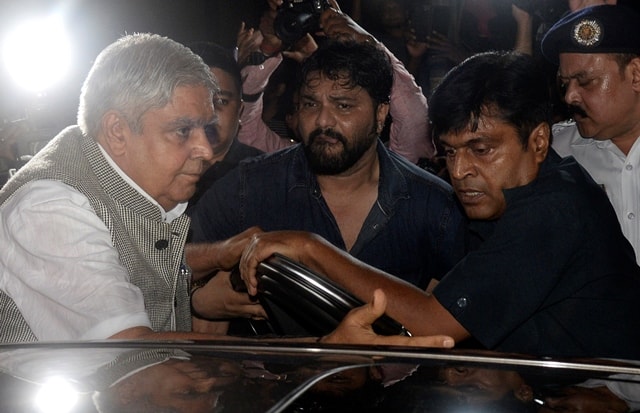
Month: September 2019

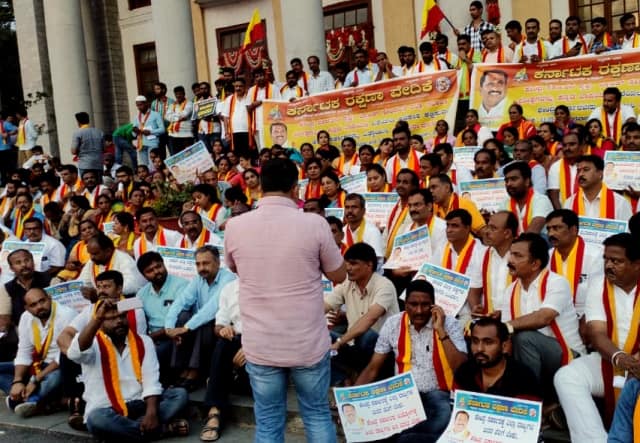
Protest Against 'One Nation One Language'
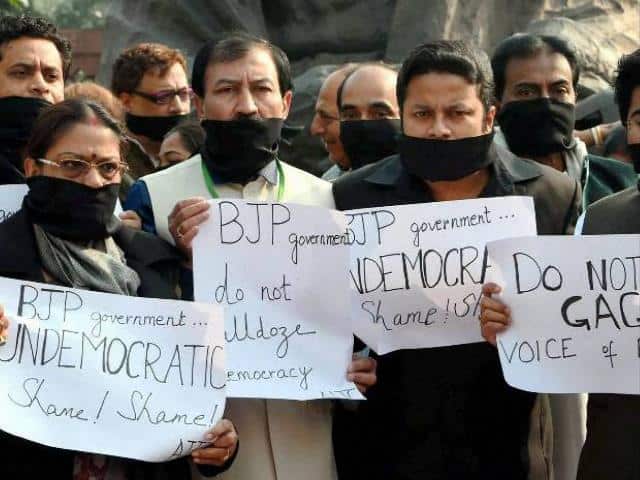
Muzzling Political Dissent Is The New Normal Now
Each time Bharatiya Janata Party leaders get on to a podium they never fail to mention the suffering endured by their senior colleagues who were thrown into jail by Indira Gandhi in 1975 when she declared a national Emergency.
These references are invariably peppered with strong critical comments about how dissenting voices were suppressed during those dark days, the media muzzled and democratic norms crushed by wielding the proverbial stick.
While recalling the BJP’s struggles, its leaders cite their experience during the Emergency to pledge their party’s commitment to the freedom of the press and citizen’s rights. They vow to uphold democratic values and Parliamentary norms and promise never to silence their critics by going down the road traversed by Indira Gandhi.
However, all these promises and declarations have a false ring to them today. Ever since the Modi government came to power five years ago, it has systematically targeted its opponents, whether they are political leaders, human rights activists or journalists, by arresting them, filing police cases against them and embroiling them in prolonged legal battles. With the Centre taking the lead, it is not surprising that the states have been quick to follow suit and this phenomenon is not confined to BJP-led governments alone.
And all this is happening without declaring a national emergency. Little wonder then that this government’s detractors these days often remark that the country is witnessing an undeclared emergency. There is, however, a difference between 1975 when Indira Gandhi declared an emergency and the present situation. Indira Gandhi’s move met with strong public disapproval and this anger was reflected in the 1977 Lok Sabha election when the Congress was routed. But today, the Modi government’s decisions enjoy wide popular support and are actually cheered on by the people.
Or alternatively, the people are plain indifferent to these daily occurrences. All those who would normally be expected to raise their voices against these developments are silent. The opposition parties are battling for survival, civil society has been crushed and the media has been successfully co-opted.
Take the case of the detention of mainstream political leaders, activists, lawyers, other professionals and students in Kashmir since August 5 when the Modi government moved quickly to abrogate Article 370 in Jammu and Kashmir and bifurcate the state into two Union Territories. Three former chief ministers – Farooq Abdullah, Omar Abdullah and Mehbooba Mufti – are under house arrest while their party colleagues have also been detained. On September 16, Farooq Abdullah, a sitting Lok Sabha member, was booked under the draconian Public Safety Act which allows the state to detain a person for up to two years without a trial.
There have been some murmurs of protest against the government’s latest move to slap the stringent Public Safety Act against the three-time former chief minister by opposition parties but it is too early to say if it will be followed up with any concrete action. So far, there has been virtually no protest or any sign of a public outcry over the large-scale “arrests” undertaken in Jammu and Kashmir even as BJP national general secretary Ram Madhav shrugged these off, saying that “preventive arrests are a part of political activity.”
The August 5 developments have since been emulated by state leaders. Andhra Pradesh chief minister Jaganmohan Reddy of the YSR Congress, lost no time in placing his predecessor and political rival Telugu Desam Party chief N.Chandrababu Naidu and his son under house arrest. The chief minister resorted to this extreme measure when Naidu staged a protest against the YSR Congress for its mishandling of TDP workers.
At the same time, the Congress-led Chhattisgarh government arrested Amit Jogi, the son of former chief minister Ajit Jogi, on charges of cheating and forgery for giving false information in his election affidavit. He has been denied bail. Ajit Jogi himself is in the dock after a case was registered against him for falsely claiming in his election affidavit that he is a tribal.
In both these instances, the actions of the incumbent chief ministers are driven by a personal agenda to settle scores with a rival. While Reddy and Naidu have been locked in a prolonged political slugfest for the past several years, Chhattisgarh chief minister Bhupesh Baghel’s rivalry with his former Congress colleague Ajit Jogi is also well known.
It is the same story in the case of former finance minister P.Chidambaram who has been arrested in the INX Media case. Home minister Amit Shah was similarly arrested in an alleged false encounter case when Chidambaram was heading the same ministry. A host of other opposition leaders have also been slapped with various charges of financial impropriety, cheating and money laundering. The list is long – it includes former Haryana chief minister Bhupinder Singh Hooda, Karnataka Congress leader D.K.Shivkumar, Nationalist Congress Party leader Praful Patel, former Congress treasurer Motilal Vora, even Sonia and Rahul Gandhi. West Bengal chief minister Mamata Banerjee’s party colleagues are also facing the heat from the Central Bureau of Investigation.
The Modi government’s ire is not confined to political leaders alone. Social activists, lawyers and renowned academics like Sudha Bharadwaj, Varavara Rao, Gautam Navlakha, who work for the rights of the rural poor and tribals, have been booked for inciting caste-violence and for being sympathetic to Maoists. None of them have got any respite from the judiciary though it is over a year since they were detained.
Among others, journalists have also been at the receiving end. Only recently, a spate of cases have been reported from Uttar Pradesh where local media persons were picked up by the police for showing the administration in poor light. Journalist Pawan Jaiswal was booked for circulating a video showing children being served roti and salt in their midday meals in a school in Uttar Pradesh’s Mirzapur. Five reporters were arrested in Bijnore when they ran a story that a Dalit family had put their house on sale after they were denied access to the village water pump. Then there is the case of another journalist in Azamgarh who was booked by the Uttar Pradesh police for reporting how children were mopping floors in their school.
But all these incidents have left people unmoved. Because it is the new normal in India.
]]>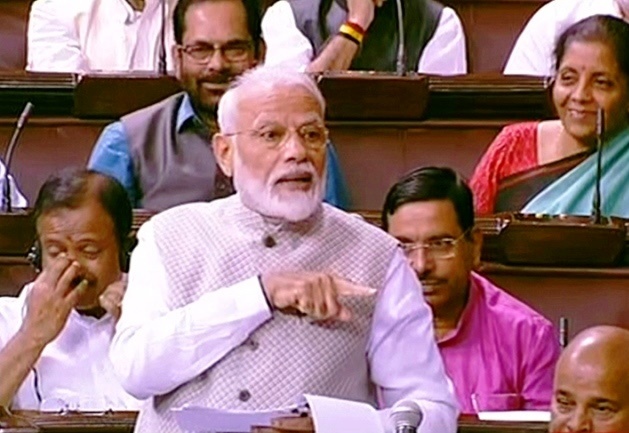
Modi Seeks Support For 'New Kashmir'
“Earlier, people used to raise the slogan — Kashmir Hamara Hai (Kashmir is ours). But the time has come to take Kashmir to a new height of development. The slogan is — Naya Kashmir Banana Hai. I need your support in our efforts to start a new era of development in Kashmir. We must make Kashmir heaven,” said Modi while speaking at the conclusion of ‘Mahajanadesh Yatra’ here.
“A lot is being done to perpetrate terror. But the people there have made up their mind to give up terror. They want to progress now. They want employment. This decision is to bring out people of Jammu and Kashmir and Ladakh from violence, terrorism, separatism, and corruption,” he added.
Modi said that his government had promised to make new efforts to address the problems in Jammu and Kashmir and Ladakh. “Today, I can say with satisfaction that the country has started walking towards fulfilling those dreams,” he said.
The Prime Minister said the decision of abrogating Article 370 is for the unity of India. “This decision is going to be the medium of fulfilling the aspirations and dreams of the people of Jammu and Kashmir,” he said.
Attacking Congress and NCP over their stand on Kashmir, Modi said that the statements of their leaders were being used by enemy countries at the international forums against India.
“It is sad to see how senior leaders of Congress and NCP have not supported us. I can understand the Congress’ confusion. But Sharad Pawar? Why is he talking like this? He says he likes Pakistan. This disheartens me,” he said. (ANI)
]]>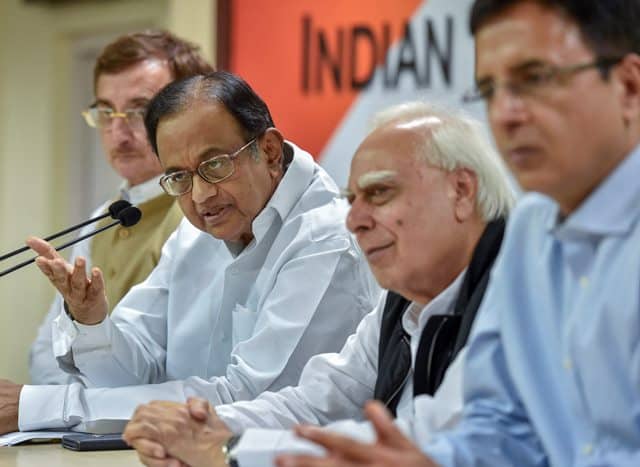
Chidambaram To Be In Tihar Till Oct 3
Special judge Ajay Kumar Kuhar allowed the counsels representing Chidambaram to get a few documents signed by their clients, including a parliament pass for his driver and a letter to the PNB bank manager for his bank account statement.
Chidambaram appeared before the court today at the end of his 14-day custody in connection with the case. He was arrested by the CBI on August 21 and was in its custody till September 5.
The agency, through its counsel Solicitor General Tushar Mehta, moved an application in the court seeking an extension of Chidambaram’s judicial custody.
Kapil Sibal, representing the accused, strongly opposed the application.
One of the counsels appearing for Chidambaram also moved an application seeking regular check-up and adequate supplement diet for his client in jail, asserting that he is facing various ailments and has lost some weight during his jail-term.
Sibal requested the court to allow Chidambaram to be medically examined in All India Institute of Medical Sciences (AIIMS).
During the course of proceedings, Sibal asserted that Chidambaram did not even get a chair or pillow in the jail cell.
Chidambaram himself told the court that he was given chairs to sit but they were later taken away by the authorities.
Sibal also pleaded the court to let his client meet his family members after the hearing, which was allowed.
Chidambaram is facing probe in cases registered by both the CBI and the ED pertaining to alleged irregularities in the Foreign Investment Promotion Board (FIPB) clearance given to INX Media to the tune of Rs 305 crore in 2007 when he was the Union finance minister.
Chidambaram had earlier moved a bail plea in the Delhi High Court in the case, which will be heard by the court on September 23.
(ANI)
]]>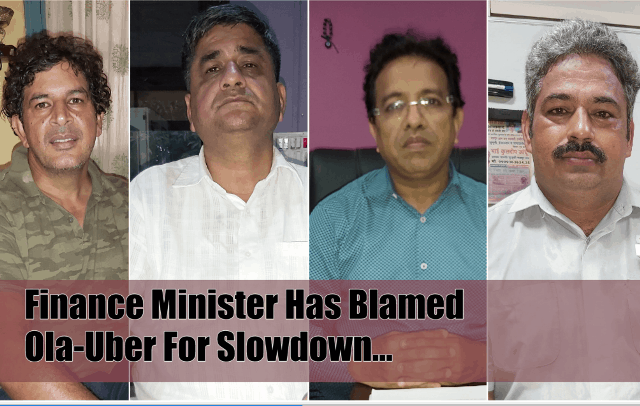
‘Auto Units Need Less GST, More Liquidity’
LokMarg visits Gurgaon and Manesar, the Motown hub of North India, to speak to ancillary unit owners, auto trade union leaders and experts about the slowdown in automobile sector. The situation on the ground is grim.
Sensex Tanks 642 points, Banks Bleed
Rampant across-the-board selling led the BSE S&P Sensex to close 642 points or 1.7 per cent down to 36,481 while the Nifty 50 slid by 186 points to 10,818.
At the National Stock Exchange, all sectoral indices were in the red with Nifty auto down by 3.8 per cent, realty by 3.7 per cent, PSU bank by 3.6 per cent and metal by 2.6 per cent.
Shares of State Trading Corporation (STC) and Metals & Miners Trading Corporation of India (MMTC) plunged by 19.6 per cent and 16.5 per cent respectively following reports that the Ministry of Commerce and Industry has decided to close down the state-owned trading firms.
But sectorally, auto stocks suffered the most with Hero MotoCorp skidding by 6.2 per cent, Tata Motors by 4.9 per cent, Maruti by 4.6 per cent, Eicher Motors by 3.3 per cent and Bajaj Auto by 3 per cent.
Banking stocks too were under pressure with Axis bank down by 4.6 per cent, State Bank of India by 3.7 per cent and IndusInd Bank by 3 per cent.
Market sentiment has been weak since two Saudi Aramco plants at the heart of the kingdom’s oil industry, including the world’s biggest petroleum processing facility, were attacked by drones on September 14.
India’s current account and fiscal deficit could take a hit if oil prices continue to rise after the attack, RBI Governor Shaktikanta Das had said on Monday.The attack on the two plants — Abqaiq oil processing facility and Khurais oil field — resulted in a temporary shortage of 5.7 million barrels per day which is 5 per cent of the global crude supply or 50 per cent of the kingdom’s oil output.
The Indian rupee has also weakened sharply and moved towards Rs 72 against the US dollar amid rising demand for the greenback vis-a-vis other currencies overseas and concerns over soaring crude prices following the drone attacks.
Global markets also turned cautious ahead of the two-day meeting of US Federal Open Market Committee. Many experts said the Fed may cut interest rate by 25 basis points.
Meanwhile, oil traded in the negative on Tuesday in Asia as it partly erased yesterday’s gains as investors awaited updates regarding the resumption of operations in Saudi Arabia. Brent crude, the international benchmark, fell 0.96 per cent to 68.39 dollars per barrel.
Asia markets were mixed in the trade as investor sentiment remained cautious with China’s Shanghai falling by 1.7 per cent and Hong Kong’s Hang Seng declining by 1.2 per cent.
(ANI)
]]>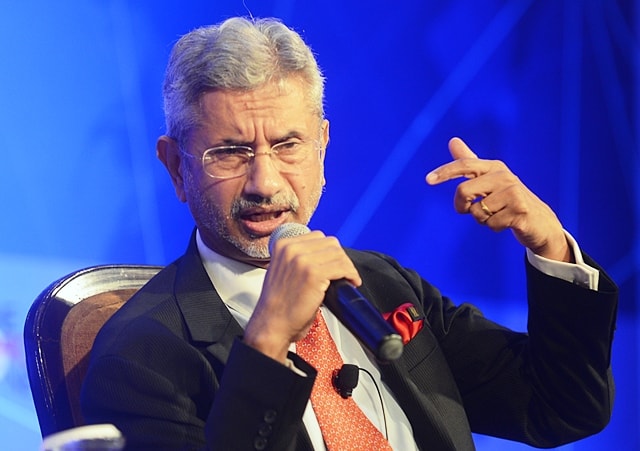
'Issue With Pak Terror, Not Article 370'
“Name any country that openly conducts terrorism against its neighbour as part of its so-called foreign policy. Until the terrorism issue is resolved relations cannot be normal and it has become the root cause of the state’s relationship,” the External Affairs Minister told reporters on the completion of Modi government’s 100 days.
“We have a unique challenge from one neighbour. Until cross border terrorism is successfully stopped. Until that neighbour becomes a normal state that will remain a challenge.
“The world community has to recognise that,” Jaishankar stressed.
On Kashmir, Jaishankar said that India’s position will not change.
“Our position has not changed since 1972. For us that has been conveyed. Our position on the issue has prevailed and it will continue to prevail,” the minister noted.
Pakistan has been ranting its diabolic rhetoric against India since the abrogation of Article 370 and Article 35 (A) that accorded special status to the region. The country has also ruled out the possibility of dialogue with India in the aftermath of the decision.
Islamabad downgraded its diplomatic ties with New Delhi and suspended bilateral trade. India maintains that the move on Kashmir is its “internal matter” – a stance that has been supported by many countries – and asked Pakistan to review these decisions so that normal channels for diplomatic communications are preserved.
In an exclusive interview to Al Jazeera, Pakistan Prime Minister had said that “in consideration to these consequences”, Pakistan approached the United Nations and other international fora on the Kashmir issue.
Jaishankar also said that he will be meeting his Pakistani counterpart Shah Mehmood Qureshi on the sidelines of upcoming 42nd United Nations General Assembly in New York.
“We will see then what do we have to discuss,” he said. (ANI)
]]>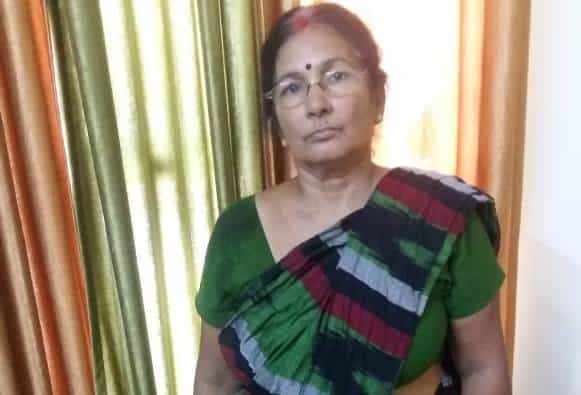
‘Get Serious Over Population Control’
Saurabh Lata Singh, 65, a housewife from Jharkhand is staunch supporter of population control. She feels if Narendra Modi is serious about the issue, he must take concrete steps and not just deliver speeches to score political points.
The Prime Minister during his speech on 15th August, said population control is an act of patriotism. Many people felt he was targeting a particular community with this statement. However, it is the mindset and ignorance that should be targeted and not a particular community.
Irrespective of religion, a majority of the Indian population still believes that having a son secure their future ensuring happiness and prosperity. I have heard of mothers killing their own daughters soon after birth in the hope of a son. What kind of a society are we living in?
Women are forced to conceive several times in the hope of birthing a son. This has an adverse impact on not just the health of the mothers but also of the older siblings, who neither get adequate nutrition or attention. Many a times, in villages elder sisters end up as nannies for their younger siblings.
Even in urban areas population control measures need a push. The Prime Minister should seriously think about this problem because it impacts the whole fabric of society and should not use it to score political points. One of our neighbours had seven children and they continued wither birthing spree, even after their first and fourth-born were boys. This is the 21st Century and we are still surrounded by people who look at contraception scornfully.
The concept of adoption is still alien to Indians. Orphaned/ abandoned children (mostly girls) continue to grow up without a family in orphanages.
I recently read about a 74-year -old woman, Erramatti Mangayamma, from Andhra Pradesh giving birth to twin baby girls. She conceived the twins through IVF and the reason she gave for having babies at this advanced age was that she felt isolated from her peers. While I have my doubts about how they will raise the two girls, what bothers me the most is why did they wait for 57 years to give birth to their own two babies? Why could they not adopt?
If we sincerely want to work towards population control we also have to work towards proper communication between couples. Sex education, pre and post-marital counselling are the need of the hour. Young people must understand that as responsible citizens, they must contribute to the society and population control is one of those ways. A smaller family is a happy family.
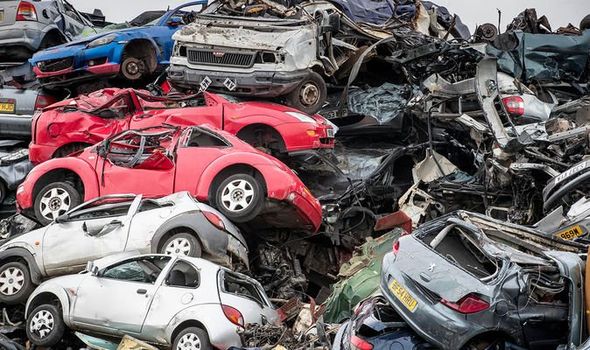
Recycle Old Vehicles: Curb Pollution, Create Business
We don’t expect our leaders to be aware of the works of the two world’s leading environmental economists Martin Weitzman, the recluse who passed away on August 27 and the Nobel laureate William Nordhaus. Even then they, specially the ones living in Delhi who are exposed to inhaling toxic air, should be well aware that the millions of end of life vehicles (ELVs) are the principal culprits for fouling the city environment.
As early as 2000, New Delhi drawing lessons from the standards in the US where the focus is on emission of nitrogen oxides (NOx) and particulate matter (PM) and the European Union where the concern is more about carbon dioxide (CO2) and carbon monoxide (CO) formulated Bharat Stage Emission Standards (BSES). In phases, the norms were made more stringent and once a new stage is set, all new vehicles will have to compulsorily conform to it.
Now the government in an attempt to ensure that all new vehicles still do less harm to air quality is leapfrogging Bharat Stage V to BS-VI to be effective from April 1, 2020. This definitely is an environment positive move, though introduction of improved technology will mean higher prices for vehicles. Definitely a small price to pay for air quality improvement. The automobile industry’s concern is that this is to happen when it is facing the worst demand slump in two decades.
Sales of cars and SUVs fell for ten months in a row till August 2019. Every manufacturer, except for new entrants like South Korean Kia and Morris Garages (popularly known as MG) owned by Chinese state enterprise SAIC, has been forced by sharp demand collapse to cut production and shut factories and showrooms. But in the process countless number of workers had to be laid off. Unfortunately our finance minister Nirmala Sitharaman instead of acknowledging what is happening in the automobile industry is one manifestation of the economy being gripped in a deep economic crisis wanted us to believe that shared mobility and young people using Ola and Uber services are the cause.
No doubt lowering of Goods & Services Tax (GST) from the peak slab 28 per cent to 18 per cent could prove to be an effective stimulus for demand revival. Many states with their finances in a bad shape are expectedly demurring. But as the situation is, the GST Council should be able to reach a consensus that cars up to a value of say Rs10 lakh will attract 18 per cent GST to encourage middle class to own vehicles. The empirical evidence through all economic crises here and elsewhere is that buying by the rich and the very rich are immune to market swings. Therefore, let the exchequer continue to get the maximum from sales of the likes of BMW, Benz, Aston Martin, Porsche and Bugatti, all recession proof.
To return to ELVs from the current automobile crisis. We have on the registers of regional transport authorities, a disturbingly large number of 28 million ELVs, predating introduction of BSES seriously compromising air quality, particularly in our principal cities. Ideally, 15 year old vehicles should be sent to scrap yard. This is based on global experience that emission level of old cars is ten times more than the ones in ideal condition. In the case of ageing trucks, their emissions are at least eight times higher than the new ones. The question is why ELVs in such numbers are still running in already highly polluted cities like Delhi, Mumbai and Kolkata without the authorities taking action against the owners? Obviously, the authorities don’t want to offend the urban middle class and transport companies in which many politicians have a stake.
Even while a vehicle scrappage policy is under consideration for quite some time, the lawmakers are not able to decide whether the owners will be forced to surrender more than 15 year old vehicles for dismantling or the scheme will be principally voluntary but with such built-in incentives that will motivate people to surrender ELVs. Back in 2016, the government was toying with a voluntary vehicle fleet modernisation programme. But nothing came out of that. In recent weeks minister for highways and transport Nitin Gadkari and Sitharaman have spoken of the need for a well considered scrappage policy.
They will do well to heed the advice of industry veteran Pawan Kr. Goenka, managing director of Mahindra & Mahindra. He says in our kind of situation the scrappage policy cannot be mandatory but has to be motivational for ELVs surrender. “People who are doing with old vehicles belong to the lowest economic bracket among vehicle owners. You should not force them to give up their vehicles. That will not be right. It has to be voluntary and incentivised. It’s also important to offer a considerable incentive to motivate people to send ELVs for scrapping,” Goenka says.
Environment and replacement of scrapped vehicles by new ones using the vehicle surrender linked incentive money are not the only issues involved in the scrappage programme. Apply the circular economy concept, you will find in ELVs sent for ‘depollution. dismantling, baling and shredding’ have a lot of wealth in the form recovered metals, specially steel, which is an important feedstock for steelmakers using electric arc furnaces (EAFs) and induction furnaces (IFs).
The thriving unorganised vehicle recycling units through their highly unscientific and environment compromising process are annually generating around 28m tonnes of steel scrap against requirements of 35m tonnes by the steel industry. Therefore the deficit of 7m tonnes are imported from the European Union, UAE, the US, Japan, etcetera, at considerable outgo of foreign exchange. The steel ministry has estimated that EAFs and IFs here will need 55m tonnes of scrap by 2030-31.
Ministry officials say considering the large local ELV population, India is well placed to generate enough scrap to meet the steel industry’s future demand for this raw material and imports could be eliminated. But for this to happen, the country must build a chain of authorised recycling units in different parts of the country equipped with automated plant and machinery. Why only self-reliance, there is potential to create modern recycling units close to ports which will facilitate import of ELVs from south and south-east Asia and the Far East and then export steel scrap. Unlike India, many countries in this part of the world do not have blast furnaces (where iron ore is used) and make all their steel through EAFs and IFs. They will be ready buyers of any surplus steel scrap that this country may generate in future.
]]>